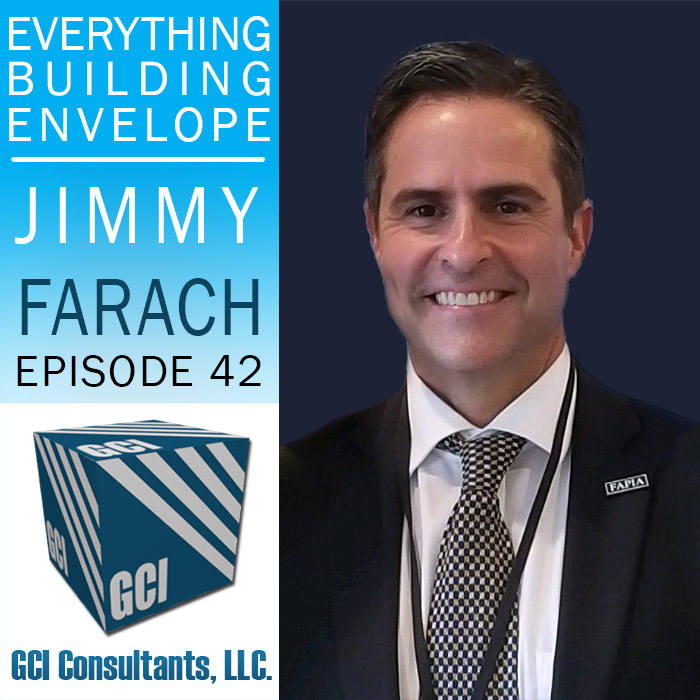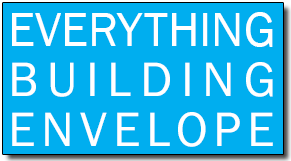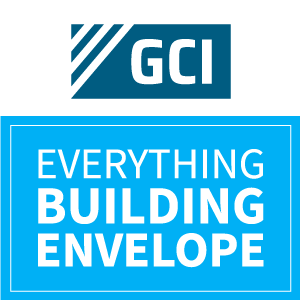
About The Everything Building Envelope Podcast: Everything Building Envelope℠ is a dedicated podcast and video forum for understanding the building envelope. Our podcast series discusses current trends and issues that contractors, developers and building owners have to deal with related to pre and post construction. Our series touches on various topics related to water infiltration, litigation and construction methods related to the building envelope.
https://www.everythingbuildingenvelope.com
*** Subscribe to the show and leave us a Review on ITunes!
Derek: Welcome to GCI’s podcast today with “Everything Building Envelope.” I’ll be your host today. My name is Derek Segal. I’m a building envelope consultant. My special guest today is Jimmy Farach. Jimmy is a public insurance adjuster and also current president of the Florida Association of Public Insurance Adjusters. Welcome, Jimmy.
Jimmy: Thank you so much, Derek. Good afternoon.
Derek: Glad to have you. I think for our guests, Jimmy, why don’t you tell us a little bit about yourself and your journey along the way to becoming who you are today and the president of the association?
Jimmy: Thank you again for having me. Yeah, my career in the insurance plans business started a bit after Hurricane Andrew, back in 1992. I was studying construction management in Florida International University in Miami, Florida. And I got to meet an independent adjuster in one of my courses. And I was introduced to what I do today and been doing for the last 25 years or so, which is negotiating and documenting property claims. So it was a nice foundation to have the construction management background and general contracting background. My father’s an architect so I’ve been around building construction since I was born.
And a little bit later down in my career, in 1999, 2000, I secured my public adjuster’s license here in Florida, and subsequently secured licenses in several other states around the country. And during that time, in 2008, Derek, I got interested in joining a committee for the Florida Association of Public Insurance Adjusters, and got more involved, and was asked to serve on the board. And it’s been a great experience in the last 10 years. And I just, as you had mentioned, been elected president. It’s an honor to be president and serve our public adjusters in Florida.
Derek: Excellent. That sounds really good, Jimmy. I got to tell you, I’m really excited about today because there’s a tremendous amount of good, valuable information, the questions that I have that I think will truly help people understand the business and what the challenges are today given, you know, the recent storms we’ve had. So with that said, I’m curious to find out, you know, what you think on the types of damages, you know, from perhaps the storm we had recently, Hurricane Irma, your seeing out there versus the ’04, ’05 seasons, I guess, the strongest storm we had, which was Hurricane Wilma in ’05. What types of damages differences are you seeing out there?
Jimmy: Well, yeah, a good question. So yeah, back in ’04, ’05, there was definitely 4 to 5 storms that hit Florida from different angles. Obviously, one from the West Coast, and then we had Hurricane Irma…I’m sorry, excuse me, Hurricane Katrina and Hurricane Wilma and Jeanne and Frances. But the one thing that sticks out in my head right now from this storm and the difference is the slow process. Claims, seen and getting consultants down to the properties has been very slow, very sluggish. And I guess one of the reasons is the timing where, you know, just 3 weeks prior to Hurricane Irma on September 10th, as we all know, on August 17th, Hurricane Harvey hit Texas and it was a very, very large storm. And as we saw on the news, Houston was flooded. It’s so terrible to hear what…you know, there was rescues and, you know, life and basically humans and pets that were endangered.
And then Irma hit three or four weeks after, followed by Hurricane Maria. So the Caribbean, the Gulf Coast in Florida were impacted. And I think one of the main things that is very relevant is Hurricane Irma affected the entire state of Florida. I mean, it was a massive storm, as we all saw on the news. It had made its path and basically clipped the Lower Keys, and then the west coast of Florida, basically covering the entire state from east to west, and from south to north. And it’s amazing how it went up to the Central, and I-4 corridor, and Orlando, Tampa, even in Jacksonville and Dayton Beach. So I think that’s one of the main points and one of the main differences that I see, the intensity of the storm. So what are you guys seeing as far as the difference at GCI?
Derek: Yeah. Obviously, we’re out there quite a bit, like yourself. I think, you know, one of the things that sticks out in my mind, difference-wise from the ’04, ’05 versus this year, or 2017 as well, which, you know, a lot of storms hit Texas as well, is that Irma was such a slow-moving storm. You know, Wilma and all the others were obviously stronger in intensity, but Irma was very impactful in the sense that it was such a prolonged event, in some periods it lasted up to 18, 19 hours of cyclical winds, torrential rain up to, you know, 15 to 20 inches of rain. And even though the winds weren’t as strong as of Wilma, we’re seeing a tremendous amount of damage out there just because of the duration of the storm and the geographical size of the storm. And so, in my mind, this was a much bigger event for the entire state than simply, you know, an isolated event. And the damage is a little more subtle, but there was definitely a lot of damage to windows, doors, roofing systems, and the entire building envelope that I’m seeing.
Talk a little bit about, you know, some of the way the claims are being handled. I know this is kind of a bias question, but do you feel your role as an advocate for a property owner or a property manager makes a difference in the way these claims are going? Or do you think they’re fine just handling these things on their own?
Jimmy: No, I think absolutely we make a difference. Again, policy holder advocates and protecting the consumer, and more importantly on these emergency claims such as a hurricane. And again, as licensed professionals, we’re there for the policyholder during these difficult times of putting together a very cumbersome claim, whether it’s commercial or residential, as far as other different coverages on their dwelling and then their respective inventories, or loss of use, or even on a commercial policy, you know, putting together the business income loss, or loss of rents. So absolutely, we make a difference and we…because the client or the policyholder, you know, after a difficult time, I mean, they’re taking care of, number one, their families, their businesses, in some cases their clients. And we, you know, as policyholder advocates, come in after to pick up the pieces and make them whole again and put it together, so that way the insurance company would make them whole on a loss that they suffered.
Derek: It’s obviously a pretty emotional time for all these people as well. I mean, I know I have been through it…
Jimmy: Absolutely.
Derek: [inaudible 00:07:13] myself. I mean, the last thing you’re thinking about is, “How do I evaluate the damage?” You’re happy to be alive, you’ve never been through something this traumatic, your home, which is your castle or your building, is damaged, and you feel like the rug’s been pulled out from under you. And I know from experience that it’s a very emotional and scary time. So to have someone like you or ourselves involved, just takes that pressure off so these people can really concentrate on their families and just recovering, you know, emotionally and physically from this almost, you know, traumatic event that they have. It’s almost as bad as losing a loved one because it’s almost like something has invaded kind of your private space.
Jimmy: Yes, I would totally agree with that statement. I think, furthermore, you know, for the typical policyholder, I mean, most consumers, obviously they have their coverage and it’s required by their mortgage company or their lender. And let’s face it, they’ll shelve the policy. And a lot of these policies, as we all…you know, for the audience out there, the policy is an actual contract between the insured and the insurer. So there’s many conditions and post-loss obligations. And I think that’s where we step in as professionals to assist the policyholder on providing the burden of proof of the damages. And when I say the burden of proof, you know, putting together the respective estimates, and getting experts involved such as causation experts. And again, what do I mean by causation expert? An expert such as your firm, Derek, GCI that could document and show there was a breach in a roof, or as you said earlier, in a window, door opening, building envelope.
And I think additionally, the time constraints, some of these policies have some time constraints that are very sensitive if the carrier requests certain documents or requests certain proofs of loss, documents proving the amount of your loss, what is the insured claiming, what’s the dollar amount. And again, that’s our job to appraise and assist and document the claim from A to Z for a policyholder. So, as I said before, it could be very cumbersome and very difficult to do this. On top of the added pressure of, as you just mentioned, Derek, the emotional stress of securing your property, and obviously sometimes moving from harm’s way and basically leaving the state, as a lot of Floridians did this past fall.
Derek: Right, yeah, absolutely. I totally agree with the way you see it as well, I’m seeing same thing. Is there anything that you do differently now when you’re, say, first coming onto a site where it’s potentially been damaged or affected by a storm, the way you investigate or assess damage today versus 10, 12, 13 years ago? Or have you always done it your way? You know, obviously, since you have the background in construction and your dad’s an architect, have you always done it the same way, or do you do it differently now than you have done it? Or what’s your experience?
Jimmy: So, yeah, as far as changing the ways, we all have our ways of conducting business and approaching a claim. And granted, yeah, I have to say that in 10, 12 years, I mean, the industry’s changed a lot. And again, personally, I’m very humbled to be where I’m at, and I stress to even our membership at FAPIA and they’re proactive, and we learn every day something. These policies are…you know, insurance policies are changing, Derek, constantly. There’s a lot of erosions of coverage, there’s exclusions. And I think it’s very important to stay relevant to the market.
But to answer what you asked me, I think it has changed in a way where now, in 2018 as opposed to 2006, ’07, or after the ’04 and ’05 storms, yeah, we’ve had to rely more on the experts. And again, as I said earlier, we have the burden of proof for the insured that, yeah, there was physical damage as a result of this storm, and proving that physical damage. And what I mean by that? Obviously, on a case like on a roof where, let’s say it’s a commercial building, Derek, and it’s a flat roof, and the insurance company’s inspecting the loss but they don’t see removal of the actual material or a peel back, as we call it in the industry. Now you have to go to step two or option B, which is obviously do some further testing, moisture surveys, some core testing to prove the physical damage.
And again, I think it’s important to rely on experts that could document this. And again, it’s very simple. To me it’s basically if the insurance company is doing it and they’re bringing out their consultants, both building consultants and engineers, it’s prudent for us as policyholder advocates to have our team of folks to do it and present our side of the claim.
Derek: Right. And obviously, you know who the right experts are to bring out since you’ve been in the industry a while, and you can short-circuit that for the insured as well.
Jimmy: Correct.
Derek: So, you know, I think you bring great value to the client and to this person that’s stressed out, full of anxiety, and is looking for peace of mind in someone like yourself. That’s great. Here’s a good question for you. I mean, looking into the crystal ball for the future, or even now,we’re
12 months downwind, so to speak, of Irma. If there were three or four things you could tell or suggest to a property owner or property manager to do now that we’re a year post Irma, or for any future storm, if there were three or four critical things you could tell them or advise them on, what would those be and what would you stress to those owners and those insureds?
Jimmy: I would say, number one, definitely have the property inspected, at least have an overview, again, of the entire envelope, the roof covering, the walls, any thermal imaging to see if there’s any water intrusion to the attic or walls or ceilings. So that’s number one. It’s always, again, a good idea to have it inspected. Let’s say even if it doesn’t merit to put in a claim, but at least the client knows and is rest assured that everything’s okay. And obviously, window openings and doors, garage doors, etc. And number two, I think it’s always important for the insured to have…or policyholder to have a relationship with professionals such as, you know, a public adjuster, their general contractor, and even a restoration contractor should be on call [SP] as a team in case of an issue, you know, whether it’s the…
Derek: You mean before the storm? Before the storm [crosstalk 00:14:15]
Jimmy: Oh, absolutely, yes, before the storm, right. Yes, to have a plan in place where, you know, they would be able to mobilize in case that they have to tarp a roof, board up some windows, or obviously the actual contractor would be already well aware of the property. And the insured would feel a lot better knowing that they’d already vetted that company correct, and they had the references and had a relationship for future business.
And I think number three would be document, document before the storm. What I mean by document? Obviously, have photographs, have video specifically of personal property, of inventories, of any valuable items such as furs or any collectables, furniture, electronics, etc. And then, obviously, and the property as well, the roof, and showing the condition of the home or the business or the commercial building prior to the loss. And even a step further, Derek, have an inspection showing that, you know, like a moisture survey showing the roof is in great shape. Now, after a storm is where you show that there was a difference, and there was direct physical damage to the property. So I think that’s number three, documentation.
And number four, I would say have a yearly or every two…twice a year, excuse me, speak to your insurance broker or agent to go over the coverages, and make sure that you’re up to date on replacement costs to what the current market price is, and that you specifically look at the exclusions, specifically wind storm exclusions for hurricanes and name storms, and deductibles, and make sure that the agent is giving you all those options. So I think those are four critical points for any consumer or policyholder to do.
Derek: You mentioned the term “replacement cost.” If a property owner has a claim, he is going to get compensated by the insurance company. Does the insurance company… What is replacement cost? I’ve heard that term, I’ve heard of actual cash value, I’ve heard of replacement cost. What is the fee gonna be, what check is he gonna get, and what are his obligations are gonna be? Like, what’s that process look like?
Jimmy: And a good point, again, that you’re mentioning, Derek, because, as I stated a few moments ago on differences between ’04, ’05 to now, specifically for residential losses. Replacement cost, back in ’04, ’05, the insurance companies were paying replacement costs. And obviously, replacement cost is today’s cost of replacing that particular item, so like a roof of…you know, it’s not what you paid for it when it was installed, it’s today’s replacement market price. As opposed to now, fast forward to 2018, insurance companies, that’s been removed off the policies for them to have to pay replacement cost upfront to the insured, rather they only own the ACV. And when I say ACV, it’s the actual cash value.
And simple arithmetic there is you have a replacement cost and then you have what we call depreciation. Over the years, obviously roofs deteriorate or they have a useful life. Right? Windows and cabinetry. So they would remove the depreciation. Usually, it’s based on a percentage, like 20%, 30%. I’ve seen even up to 50% on roofs. So imagine that, you have a replacement cost less 50% so the insured is actually getting 50% of the money upfront to start the work. So it puts them in a pretty tough position to amend [SP] the work.
Derek: He signed a contract for 50% more of the cash that he’s actually getting.
Jimmy: Correct. And they’re sort of, like, you know, have to say, financing the project and then they have to submit the receipts later to recover the depreciation. So on some policies it is recoverable. But I just wanted to…I’m glad you brought that up, Derek, because it’s an important topic, absolutely.
Derek: So that sounds like it’s vital to get your ducks in a row, so to speak, well in advance of any storm, understand your policy, have your building evaluate so that you have a baseline condition that you’ve stated what the condition of your property was.
Jimmy: Correct.
Derek: Not simply by just taking a couple photos of the outside, but actually have somebody visit your property and do some testing to make sure everything’s sound. And then maintain all your records so that you can give the insurance company what they’re asking for as required by your contract with insurance. There’s a lot more to this than just filing a claim and going on your way. It sounds like you’ve got a lot of homework to do, and you need people who are knowledgeable and can help you throughout the process.
Jimmy: Absolutely. And again, as public adjusters, public insurance adjusters licensed by the state of Florida, this is all we do is focus on documenting and processing property insurance claims. So yeah, you hit the nail on the head by, you know, what we just talked about archiving and having as much information to provide to the carrier when the event does happen, when there is a catastrophic [inaudible 00:19:06] hurricane event. That way there’s no misunderstanding on some of those.
Derek: So there’s no loopholes or triggers that you can make a mistake with, and then lose out on something that you’re actually entitled to, which obviously does happen and it can be even more traumatic than it really needs to be.
Jimmy: Yes.
Derek: Great. Well, I think this has been a fantastic podcast. To sum it up, I think it’s vital to have some people on your team well in advance to the storm to dig into the knowledge that’s out there. And if it’s something that you need help with, then to reach out to Jimmy or GCI. And certainly, you know, I think both of us are blessed to be in this business where we feel like we can make a real difference in people’s lives, and help them through this trauma and scary time in their lives. So from all of us at GCI, I just wanna thank you for coming on and being our special guest as the only guitar-playing president of the Florida Association of Public Insurance Adjusters.
Jimmy: Wow. Yeah, that’s a surprise to the audience, right? That would be only bass guitar and electric guitar player in the 25-year history of FAPIA. But thank you, it’s my pleasure.
Derek: Great. Well, I really appreciate you coming on. And I look forward to…
Jimmy: Right. And if I could just end it with one note, Derek, and you just mentioned that it’s [inaudible 00:20:30] a central theme and common denominator is we are helping the citizens of Florida and the property owners of Florida that when they’re in this unfortunate position, pick up the pieces, and again, put it all together, that we’re there helping the client. And once you put that first, everything falls into place and feel good about it because obviously, yeah, we are serving the community, we are helping the residents, our neighbors. So again, it’s been my honor and pleasure to be here today on this podcast, and I wanna thank GCI for the opportunity.
Derek: Thanks so much, Jimmy. And we look forward to seeing you for many, many years to come. Take care of yourself.
Jimmy: Thank you, sir.
Derek: Thanks, everyone, for joining us at GCI for our podcast with “Everything Building Envelope.” We look forward to providing many more like this valuable and informative sessions where we can help. Thank you.


